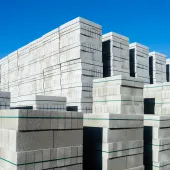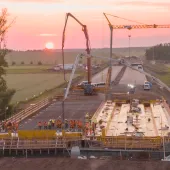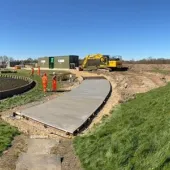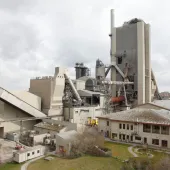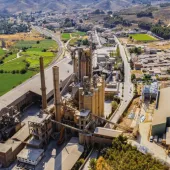Innovate UK to invest in decarbonising concrete industry
Innovate UK, the UK’s national innovation agency, has announced an investment of £3.2 million in seven key projects aimed at accelerating the decarbonisation of the UK’s concrete industry. The funding will support innovative solutions designed to reduce the carbon footprint of concrete, one of the most carbon-intensive materials in the construction sector.
The seven projects selected for funding cover a range of approaches to low-carbon cement and concrete production. These include the development of new materials, repurposing waste products, and introducing cutting-edge technologies to lower emissions.
The projects receiving funding include:
Cemcor: This project focuses on developing calcined clay from low-grade sources, which will be used to produce a new generation of low-carbon cement and concrete.
Cocoon Carbon: Funding will support the scaling up of a novel cementitious material created from by-products of electric arc furnace steel production, a potential game-changer for low-carbon construction materials.
Skanska UK: Skanska’s project will repurpose excavated London Clay, turning what would normally be waste material into a resource for concrete applications, reducing both waste and carbon emissions.
Cemex UK Operations: This project will combine micronised limestone and graphene in concrete, a process known as CoMLaG, which can significantly reduce the carbon footprint of concrete production.
John Sisk and Son: Sisk-led consortium, which includes Ecocem Global, Ramboll, Loughborough University, Creagh Concrete, Capital Concrete, and the Building Research Establishment, will implement Ecocem’s low-carbon concrete technology, demonstrating it in live construction environments to prove its potential as a scalable solution for decarbonising concrete.
EFC Green Concrete Technology UK: This funding will help scale up their LowCast geopolymer cement technology, an innovative approach that offers a sustainable alternative to traditional cement.
Materials Processing Institute: This project will develop recycled concrete fines (RCF) to be used as a low-carbon substitute for traditional cement, reducing both material waste and carbon emissions.
In addition to the funding, these projects will collaborate with Innovate UK’s Concrete Commitment Cohort (CCC), contributing to the ongoing development of an Advance Market Commitment (AMC) for concrete. AMCs are commitments from government or private entities to purchase or subsidise low-carbon products, such as concrete, once they are successfully developed. The aim is to create demand and encourage further production of sustainable materials.
Dr. Stafford Lloyd, innovation lead for Clean Growth Strategy at Innovate UK, said: “We’re excited to support these cutting-edge projects through the Decarbonising Concrete competition. These projects are exploring alternative cements and new production methods that include innovative additives. Our work on AMCs is also helping to accelerate the commercial adoption of low-carbon concrete, and we’re looking forward to seeing these projects make a significant impact.”
The Contracts for Innovation: Decarbonising Concrete competition, previously known as the Small Business Research Initiative (SBRI), is a vital part of Innovate UK's strategy to speed up the adoption of low-carbon concrete solutions. By linking innovative projects with end-users in the construction sector, the competition aims to create strong collaborations that can bring low-carbon concrete to market more quickly.
This initiative is funded through Innovate UK’s Net Zero Systems programme, which supports projects designed to reduce carbon emissions across key industries. The programme builds on previous work completed as part of UK Research and Innovation’s Transforming Foundation Industries (TFI) challenge, which focuses on making the foundation industries, including cement, greener, more competitive, and more sustainable in the long term.
Bruce Adderley, challenge director of the TFI programme, added: “The TFI challenge is all about promoting innovation in high-emissions industries like concrete. The Decarbonising Concrete competition is a great example of how we can push forward the development of greener solutions. The seven funded projects show the best ideas out there for making concrete more sustainable and reducing its environmental impact.”
Projects that did not receive funding will still have the opportunity to engage with the broader decarbonisation programme, including the work on the AMC for concrete. Innovate UK is committed to creating a more sustainable future for the construction industry by supporting the development and commercialisation of low-carbon technologies.


